AuthorA 20 year old fitness enthusiast and dedicated Olympic style weightlifter. I am a Level 2 Weightlifting coach, Powerlifter, and non-competitive Irish dancer. I'm determined to live a healthier lifestyle and take care of my body whilst influencing other young people to do so. I never doubt my ability to achieve something; I just change what I'm doing until I succeed. Archives
May 2021
|
Back to Blog
Eating when you're bored can be very difficult to stop doing as it's a very easy habit to get into. For instance, you're sat on your sofa watching tv. You may feel strange without food in your hand, therefore resulting in you searching your cupboards for any junk food you can find. Then, sitting back down and continuing to grab more food until you're occupied with something else. Its an endless cycle and in order to improve fitness wise, it may be best to get rid of the habit. I often question myself whether I am actually hungry, craving food, thirsty or just bored and procrastinating. Please continue reading to find out more on how to stop eating out of boredom. If you aren't sure what junk food is classed as, please check out this blog post of mine: Distract yourself with something else My summer bucket list My summer bucket list Often the key to stopping yourself from doing something can involve distraction. So if you're struggling to fight the urge to walk in your kitchen and rummage through the cupboards for anything you can devour, why not decide to do something else instead. For instance, I'm sure there are plenty of better things you could be doing rather than eating something unhealthy which you may regret later. If you know you usually eat when you're bored, make a list of some things you can do instead. For example, since its the summer holidays here in Britain, I made a list of things I need to do this summer. Some of them are big, some of them are small, but its something I can focus on when I'm tempted to eat when I'm bored and not hungry. Here is a small list of other tasks you could do rather than eating when you're bored:
Drink waterI've found that when I'm eating food, it may not necessarily be because I was hungry. Often, you may be thirsty if you find yourself eating for the hell of it. Drinking water is the best thing you can drink when dehydrated and can also help you to stop feeling addicted to eating junk. Water has its benefits too! It can help your skin to improve and make you feel refreshed. I wrote a blog post all about drinking the correct fluids, so heres the link for that if you'd like to give it a read. Motivate yourself to know what's right My fridge (yes, i'm running out of images, this is a low as I've reached) My fridge (yes, i'm running out of images, this is a low as I've reached) This is something which may work for you, as it works for me. Basically, if you feel the urge to grab some unhealthy snack out of boredom, think about why you're doing so. Is it because you're hungry or bored? Be honest with yourself whether getting food is going to push you a step backwards during your fitness journey. If you've done this before, perhaps learn from the experience and think about whether you felt guilty after you ate the unnecessary food. It may be very tempting and easy to go into your kitchen and scran on whatever you can find, however if you want to make progress, you must resist and overcome the feeling of eating food when you're bored. Why is it that we eat food anyway? because we're hungry and in need of energy, not just because it's there or for an accessory. By changing your mind set and realising that eating junk won't do anything but make you regret it later, you can avoid eating out of boredom. Checking your fridge for food won't help and may just make you feel frustrated and reminded of the food you shouldn't be eating. Remove the junk foodThis is the main factor I changed which helped me stop eating food out of boredom. It can be a bit more difficult if you live in a home with many people, as you may not be able to remove all junk food from your house. However, if you can, throw or give away the junk food in your house. I recommend giving the food that is in good condition to a local food bank or homeless shelter. If you cannot do this, perhaps separate the junk food in your home from the healthy food and have specific place for it in your house. If you think you'll still be tempted, why not put a lock on the cupboard it's in? When I removed all the junk food from my house, I managed to buy healthier and more nutritious food, which really helped me to progress on my fitness journey. You could workout every day, but what you eat is the main part of being fit and healthy. Tell people not to buy you junk foodPeople buying you junk food could be seen as nice or appreciative, however if you're trying to improve fitness wise, you may need to tell these people to stop. Many times before, people have bought me junk food when I haven't wanted it but because it was in my house and I viewed it as a gift, I'd still eat it. Although its difficult to decline, food gifts from other people can often cause feelings of guilt if they are left uneaten. To make it simple, I'd straight up tell somebody that you're thankful for the thought, however that you are trying to take care of your body by eating healthy foods. Many people who used to buy junk food for me, now either buy me healthy food (which I appreciate greatly) or only buy me small portions to eat on my cheat day. If you do have a lot of self control and are able to resist the food gifts from others, maybe you can keep them until your cheat day. Thank you for reading this post, please note that when I am discussing topics on nutrition that I am no where near as experienced as a professional nutritionist. However, these posts are purely my opinions and experiences. In no way, shape or form am I trying to explain that not eating much food is good for you. It is good to eat a variety of food and important to eat portions of healthy food in order to gain muscle mass and lose fat mass.
0 Comments
Read More
Back to Blog
How fitness helped my anxiety to improve23/7/2017 This is a topic which is quite personal to me and is something which I wouldn't have felt comfortable discussing two years ago. In my 'about' section on this website, I addressed the subject by saying "I can't truly say I’ve been healthy ever since I began lifting as I did end up in a situation where food became an issue for me, but there was a stage in my life where I decided that I wanted to improve my lifestyle and what I was eating. I struggled with an anxiety disorder which had an impact on what I ate for some years, I became underweight and despite my love for exercise I felt completely unmotivated to do anything. I had time off school and spent most of my days having panic attacks, but that’s all behind me now. I got help and began to look at life in a different way. I believe that without this experience I wouldn’t be the person I am today." So here it is, a more in-depth but tricky to write blog post about how exactly my anxiety has improved through my fitness journey. Please note that this topic may be sensitive material for some. Where it all startedMy anxiety disorder first really developed in the year of 2013, when a big change happened in my life. It's something I'm not prepared to broadcast to absolutely anyone in the world. As much as I'd love to, I know I'm a better person and for the sake of others, I'll keep that part of my life to myself and those who already know it. Anyway, my anxiety disorder didn't really surface and impact me daily until 2015. I can remember when suddenly it just clicked and something changed. I was on a train at the time, I felt really different and terribly paranoid. I was already seeing a counsellor at the time, so getting and waiting for help wasn't a problem. 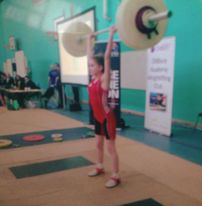 British schools and development cup, February 2015 British schools and development cup, February 2015 Picture this, I'm 13 years old, thinking about everyones opinions of me, very addicted to my phone and not at all interested in exercising everyday. I occasionally went Weightlifting but began to fall behind and stop for many months as people at my school would humiliate me for saying that I was a Weightlifter. I'm still not entirely sure what that was all about, maybe it was because I didn't 'look the part' or it was just hilarious to draw attention to someone who was doing what they loved and simply wanted to be left alone. So if you're reading this and you know why, then please contact me and let me know. After all, that was what helped me to get stronger and become more determined to succeed. The person I was back then, is not at all who i am today. I would sometimes respond to people who annoyed me or were 'teasing' me, which probably just made things worse. I could make this deep and say that those people caused me to have an anxiety disorder, in fact I could list names and complain. But I won't, because I set high expectations for myself. There were a few more fall outs I had with friends, which of course are going to happen as you don't always keep the same friends in high school forever. By then, my anxiety was just rocketing and I had 4 months off school. I gradually began returning to some of my lessons, but this time was hard as I didn't go out most days and many people required an explanation for my mental health. This I couldn't provide, meaning that some people thought I just wanted to skip school. Being off school didn't mean that I was able to have fun and do nothing all day. I was constantly living in fear from crowds, seeing people I knew, loud noises, feeling trapped, people in general, text messages, social media, making mistakes and being the centre of attention anywhere. Right now, I cannot recall the last time any of these things caused me so much anxiety that I wouldn't be able to breath or function. However, thats not to say that now and again I'll still feel as if I cannot cope if I cannot escape a situation quickly or with ease. I can truly say that once my anxiety began to improve during the end of 2015 and beginning of 2016, that I am incredibly amazed at all I have overcame. The lowest point I reached with my anxiety relating to sports was when I would struggle during Weightlifting competitions and could no longer go out for runs. But, very gradually I began to start Weightlifting, running and genuinely feeling happy again. This next part of this post will explain how fitness helped my anxiety to improve. My next step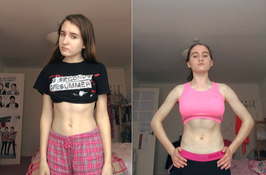 September 2015 vs May 2017 September 2015 vs May 2017 I knew when I departed from my counsellor that although I'd been given ways of coping, that I needed some sort of distraction or hobby to help me have something to do other than occasionally Weightlifting or sitting around all day wondering if my anxious feelings would ever pass. I decided that even if I was going to feel anxious a lot, I should have some activity which would help the feelings to pass and something I could set goals for. This made me realise that in order for my mental health to improve, I needed to put all my effort into Weightlifting and running in order to feel good about myself. I did this and noticed that my anxiety would no longer be there when I could put my passion into the sports. By setting myself targets and noticing improvements, I felt very motivated and felt as if I could do anything! But around this time, I still felt as if there was something missing. Although I was competing again and was constantly running to feel refreshed and calm, I became motivated by The body coach (Joe Wicks) through Alfie Deyes. I'd often spend a lot of my time on YouTube when I wasn't engaging in sports, so a certain video entitled '90 DAY CHALLENGE' really made me feel intrigued. Alfie was doing the 90 day challenge which was created by Joe Wicks, so i decided to try it too. Alfie stopped after a bit, but I continued and even reached past the 90 days. I was working out daily and eating much healthier by planning meals and cutting out junk food. After a while, I didn't even crave junk anymore and could definitely see the progress I had made.The video below is what first inspired me to begin my fitness journey (towards the end).  September 2015, faking my confidence September 2015, faking my confidence By exercising daily and organising my workout, healthy eating, Weightlifting and Running schedule, my anxiety improved by miles as I developed a positive attitude and put my heart into my passions. I think that without the determination I had, I may not have returned to being active with a new mindset, resulting in me giving up easily. But when I began the 90 day challenge in August and finished in November, I felt so inspired and proud of myself that I knew I needed to continue putting in the hard work. Hence, why I'm still active now. I realised that although I went through a very difficult situation, that I currently work hard for what I have and love what I do. Once I'd been living my new lifestyle for a year (August 2016), I realised that there was still something missing. Although, I had taken up a new hobby of Irish Dancing in February 2016, I had many creative ideas that I needed to express. I already had created my Instagram account, but I needed somewhere else where I could explain my ideas and help others. December 2016, I created this website and realised that I had found the hobby which would help to inspire myself and others. Real me, right now Right now, I would say that a lot has changed about me since 2015. I've became more focused on the important aspects of my life. I currently love myself and my hobbies, unlike back then. I feel that without my fall in life, I may not be where I am today and may look at life differently. Right now, I have plans for the future and each day I feel more and more inspired by many different things and people. I no longer spend my days worrying about what other people think of me, but more about how I'm looking after my body. Thats not to say that I still don't have problems with anxiety sometimes, it isn't very often at all and I have an excellent way of coping with the build up into a panic attack. Usually, I'll completely remove myself from the scene and look outside or distract myself by thinking about something. Thank you for reading this post, it was slightly difficult to write as I've not really discussed many personal topics about me on this blog. I hope that my experience may inspire those with similar issues to find something big or small which can help them. Whether it is sport related or not, it may be something which could help you on your road to recovery.
Back to Blog
How to stay hydrated and drink correctly11/7/2017 I've been thinking about writing a post like this for a while now, since it's summer here in England and in most places (although I believe its just became Winter in Australia!). Even when it isn't hot outside, it is important to stay hydrated as being dehydrated can make you feel awful. I understand there can be problems with people not feeling thirsty or not actually liking the taste of water. This has never been a problem for me as I was never a big fan of fruit juice or squash as a very young child. Please continue reading for my tips on how to drink healthily. Apologies for lack of recent images, I wrote this purely from no plan and didn't have many relevant images to add. Why staying hydrated is important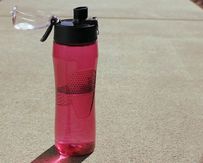 For those of you reading who don't have much knowledge on this subject, staying hydrated should be just as big a priority as exercising or planning what you eat when keeping fit. Whether or not you're trying to keep fit, drinking fluids is crucial in order for the bodies muscles, brain, heart and other parts to successfully function. By not drinking fluids, your brain may be unable to function throughout the day. Hence why it is even more important to regularly drink when learning or trying to recall any information. Dehydration can also occur faster when exercising, meaning that you should alway have liquids ready to guzzle near by. If you don't, due to the vast amount of exercise, you could begin to feel fatigued, dizzy or sick. This could stop you from continuing your exercise due to your body being too hot and needing regular fluids. How to stay hydratedStaying hydrated isn't always easy for everyone, especially when you aren't used to the amount you should be drinking. Here are my 4 tips on how to stay hydrated:
Drinking large amounts of fluidsDrinking too much water or fluids can often be a problem if you don't know the correct amount you should be drinking. However, there's no need to panic if you're over your limit by a few litres on a hot day. I'm talking about drinking gallons upon gallons of liquids (this is around 25 litres). Drinking too much water can be dangerous as your kidneys can only remove an average of a litre an hour. Many websites provide the amounts of water which should be drank depending on age and weight, however the websites can differ by almost a litre. I recommend tracking how much normally you drink within a week and comparing this to whichever site you wish to use for your example of a fluid intake goal. Personally, I aim to drink between 1500-2000 milliliters of water a day (1.5-2 litres). When attempting to set yourself a new goal with how much you drink, please don't immediately go from drinking less than 500 milliliters to nearly 2 litres! I did this and you may be needing to goto the toilet alot, may have lower abdominal pains, bloat and feel very full. That is why I suggest slowly drinking more each day before you eventually reach your goal or an amount which you're comfortable with. Many people are different and shouldn't feel pressured to drink a specific amount set by online statistics (unless they feel the need to do so). Drinking the wrong fluids This is usually the most common problem within people when drinking fluids. Not knowing what is good to drink and what isn't. Lets begin with what isn't good, often drinks containing caffeine and sugar are not going to help with keeping you hydrated (of course these aren't healthy either). Caffeine causes increased heart rate and blood pressure (hence why it helps keep you awake) but the caffeine amounts in energy drinks is an amount which makes drinks unhealthy. In fact, consuming energy drinks before exercise can make you more dehydrated than if you didn't drink anything in the first place. Smoothies and juices can be delicious, but drinking a lot can be awful for your teeth due to the high percentage of sugar from fruit. These drinks are still okay to drink, just not large amounts of them, perhaps viewing them as a treat would be better when setting limits. Personally, I only usually drink water, milk and the occasional treat drink. However, I am on the edge of converting to almond milk as I have heard information about milk which I am not keen on. Not feeling the urge to drink fluids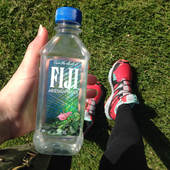 I have spoken to many people I know who don't feel the need to drink water or don't feel thirsty. That may simply be the case that they don't drink water unless they're thirsty. However, I'm talking about those people who don't drink any water throughout the day. I've been there and once you get into habits where you don't drink water, it can be hard to get out of them. The only tip I can provide for this is to find a flavour of squash you like (although squash isn't no where near as good as water)to add to water. Perhaps change the percentage of water to squash ratio each week by eventually increasing the amount of water in your cup. Eventually, you may still be able to taste a weak amount of squash, but it could be the closest you'll get to drinking water. Even if you're drinking 1% squash and 99% water, it is better than drinking energy drinks which provide you with no or very little water amounts. Thank you for reading this rather wordy blog post, I tried my best to explain my concepts of drinking and I understand if there are points which aren't mentioned or explained in detail. Due to the fact that my posts are nowhere near to a nutritionists level, my posts are purely written from personal experience and advice. Please do not use these nutrition posts for strict dietary advice, I suggest you seek a professional if in need of this help as I am merely a child.
Back to Blog
Recently due to tearing a ligament in my ankle, I've sadly had to step away from my Olympic Weightlifting schedule and training. On the bright side, this has given me much more of a chance to coach, shadow my coach and understand what it requires to coach children Olympic Weightlifting. Carry on reading to hear tips from a child about coaching younger children. Getting to know who you're coachingI think its excellent when coaches know about their kids individually. Its one thing knowing the name of who you're coaching and their performance ability, but it's also great to get to know other things about who you're coaching. For example, learning about any other sports they may be good at, what they want to be when they're older, what their goals are in the sport, what they think about their achievements etc. If a coach knows these things about who they're coaching, this could give them the chance to provide opportunities for the kids. Whilst shadowing over my Weightlifting coach, I have noticed that with new lifters who are beginning to learn the technique, he'll ask them if they do any other sports and perhaps mention how Weightlifting will improve those sports or mention something he knows about the sport. Let them have funThis is something that not all coaches will apply when teaching children a sport or skill. It's important to remember that children are still growing and learning from their mistakes, this means most children will want things to be fun and dislike boring activities. There are infact ways to make learning sports fun, rather than coaches repetitively instructing and cramming information into small growing minds for long periods of time. Personally, looking at a coaching situation from a child's eye, it is probably better to teach children when also letting them have fun, in order to let them release energy. However, including games when coaching is great but making sure children are safe in the process is the most important. Some children (because of their age) may not understand the danger of some activities, hence why the coaches should decide when children are to train and when children are to have fun. Use different methods of coachingWhen coaching children, not every child learns the same way. For example, here are some ways a child may learn something:
Changing what you coach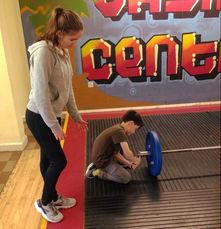 Myself showing a young lifter how to correctly attach a collar to a bar Myself showing a young lifter how to correctly attach a collar to a bar Its important to alternate what you're coaching to children during sessions, but still making sessions relevant to the information you're trying to pass across. For example, if you were trying to teach children how to understand the point system or noticing the technique of others, getting them to score each others lifts would be appropriate but different. I've also encouraged my coach to explore the variation of coaching Olympic Weightlifting and Powerlifting to the children as this is something which we both feel will help build strength, improve the key positions and even help gain points through the squat. Even if children aren't gaining new personal bests every session, it is still an achievement if a child is taught something which they didn't know about the sport or skill. For more information about the Olympic Weightlifting point system for children under the age of 13, see the link below. Instructing the group, as a group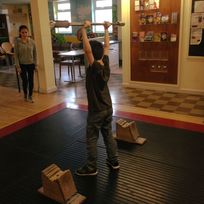 An individual lifter being coached An individual lifter being coached When I went on my work experience in March to a gym, I often overlooked individual personal training sessions and fitness group classes. I noticed that when personal trainers were helping their clients, sessions would be a lot more close as the personal trainers were able to guide just the one person. However, in a group fitness class, a person was given help when others were occupied. Meaning that groups were never left standing around or waiting for the class to continue whilst one person caught up. To instruct a person in the group class, quick demonstrations or key words were often repeated or the entire group was reminded again about the issue. This should be the way that groups of children learning a sport or skill should be handled. Sometimes if children are left to their own devices, boredom or distractions can occur. Often instructing individuals in a group can be appropriate if the group are watching the person being put on the spot. For example, if a group of children were to examine one lifter in the group to help recognise competition structure. Showing strictness with reason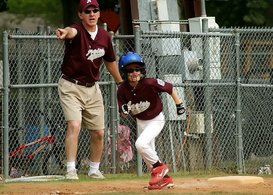 A mistake which shouldn't be made is being too strict when coaching children (or simply being too lenient). Coaches should remember that children are merely growing and trying to grasp new concepts almost daily! Some may take longer than others and some may differ in confidence. But this isn't something which coaches should view as a weakness or simply that children are being naughty. To recognise whether a child is purposely doing something which requires strictness or some rules being enforced, think about the child's age, emotions, capabilities and reason. There may be a significant reason behind the child's actions which could easily be resolved by somebody just taking the time to realise that the child cannot always help what they're doing. Being too strict when coaching could cause a childs behaviour to worsen if they dislike the way they're being treated. By being too lenient when coaching, children could mess about which results in being in a dangerous situation due to feeling the need to gain the attention of the coach. Thats why by explaining and asking the child why they're behaving like that or telling them the benefits of the activity which they may be refusing to do, can help give reasons to the child as to why they should listen to the coach. Thank you for reading this post. Please note that I am still a child myself when writing this and have some experience when coaching Olympic Weightlifting to children. This post is simply from my eyes and explains my examination of several years worth of coaching. In no way have I gained a coaching certificate yet and simply provide this post to give tips and advice from a child's point of view.
|